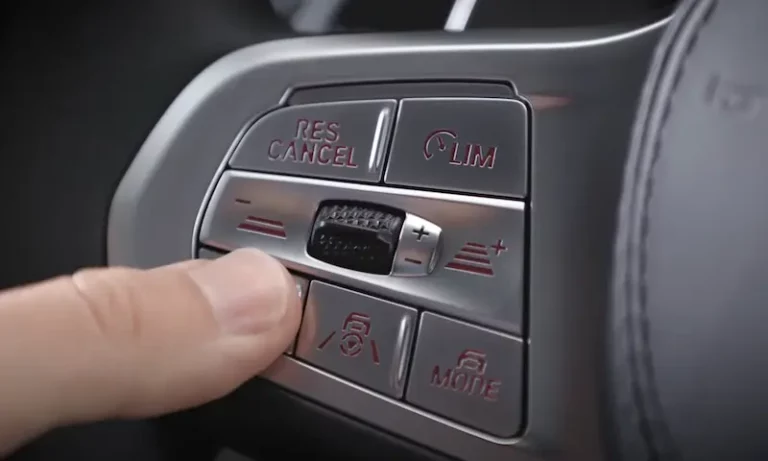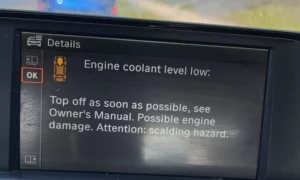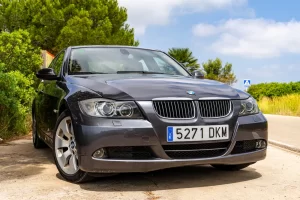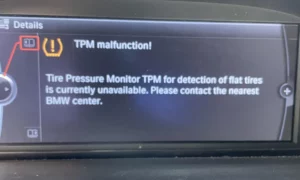BMW cruise controls are designed to make your driving experience more enjoyable and efficient. However, there might be times when you experience a cruise control malfunction, which could be caused by several factors.
In this article, we’ll explore BMW cruise control malfunctions, their common causes, and how to address them. Stay tuned as we delve into this essential feature of your BMW and provide valuable insights on keeping it in proper working order.
Common Signs of Cruise Control Malfunction
The first sign of a cruise control malfunction in your BMW is typically a warning light appearing on the dashboard. This light serves as a response to an issue detected by the car’s system and could indicate a potential problem. Let’s discuss some common causes of cruise control malfunctions.
One possible cause for a cruise control malfunction is a blown fuse. Fuses protect the electrical system from damage, and if one related to the cruise control system blows, the system becomes non-operational. Replacing the blown fuse may resolve the issue.
Another potential issue is related to the battery. Sometimes, a weak or dying battery may not supply enough power to the cruise control system, leading to a malfunction. In such cases, it’s a good idea to check your battery and replace it if necessary.
A dirty speed sensor can also cause problems with your cruise control system. The speed sensor measures your vehicle’s speed and assists the cruise control in maintaining a constant speed. If this sensor becomes dirty or damaged, it may send incorrect signals to the system. Cleaning or replacing the speed sensor may eliminate the issue.
Wiring problems can also contribute to cruise control malfunctions. Over time, wiring connections may corrode or wear out, affecting the electrical components the cruise control system relies on. Fixing or replacing the wiring is necessary to ensure proper functioning.
A dirty or damaged throttle control may be the culprit. The throttle control helps manage your engine’s speed while in cruise control mode. If it’s dirty or damaged, it won’t work correctly, leading to a malfunction. Cleaning or replacing the throttle control should help solve the problem.
Potential Causes of Cruise Control Malfunction
Failed Sensors
One possible cause of a BMW cruise control malfunction can be attributed to failed or dirty sensors, such as speed sensors. These sensors communicate with your vehicle’s computer, providing crucial information for cruise control to function properly. If any of these sensors become dirty or malfunction, the cruise control may not work correctly. Cleaning or replacing faulty sensors might resolve the issue, but it’s always best to consult with a mechanic or your local BMW dealer to diagnose and fix the problem accurately.
Faulty Fuses
A faulty or blown fuse might be the root cause of the cruise control malfunction. Fuses are responsible for protecting the electrical system, and if one blows, it can cause various components to stop functioning. To check if this is the problem, you can consult your vehicle’s wiring diagram or take it to a garage to have a professional look at it. If a blown fuse is discovered, replacing it might restore the cruise control function.
Communication Mishaps
Occasionally, communication between the vehicle’s computer and the control modules might be interrupted, causing a cruise control malfunction. This issue can result from multiple sources, such as damaged wiring or a faulty control module. To accurately diagnose the problem, it’s recommended to use BMW’s ISTA software or consult with a BMW dealer or professional mechanic who can analyze your vehicle’s communication system and resolve the issue.
Malfunctioning Actuators
Actuators, like vacuum actuators, are responsible for controlling the throttle and maintaining a constant speed while using cruise control. If these components malfunction, your cruise control might not work as expected. This issue can be caused by a worn-out or damaged actuator or problems within the vacuum system. If you suspect that your vehicle might have issues with the actuators, it’s advisable to consult a professional mechanic or your local BMW dealer to diagnose and correct the problem.
Steps to Resolve Cruise Control Issues
In this section, we will discuss how to resolve BMW cruise control malfunctions. We will look at some DIY fixes you can try, along with professional repairs that may be necessary.
DIY Fixes
First, let’s consider some DIY fixes for your BMW cruise control issues. One common issue is a blown fuse. Check your vehicle’s fuse box to locate the cruise control fuse, and inspect it to see if it’s blown. If so, simply replace it with a new fuse.
Next, you should inspect the speed sensor, as a dirty or damaged sensor can cause cruise control malfunctions. Gently clean the sensor with a cloth to remove any debris or dirt. If you notice damage or suspect a faulty sensor, consult your BMW owner’s manual or a garage for guidance on replacing it.
Wiring issues might also lead to a malfunctioning cruise control system. Inspect the wiring harness for any visible damage or signs of wear. If you’re comfortable with automotive repairs, you may be able to fix any wiring issues yourself; otherwise, seek professional assistance.
Professional Repairs
If the DIY fixes above don’t resolve the cruise control malfunction, it’s time to consult a professional. Make an appointment at your local BMW dealer, as they will have access to specialized diagnostic tools, such as ISTA, to identify the issue.
In some cases, your BMW’s cruise control malfunction may be covered under warranty. Consult your vehicle’s warranty documentation to see if you’re eligible for coverage. Even if the repair isn’t covered, it’s wise to have your BMW dealer handle the repairs to ensure the problem is properly diagnosed and resolved.
Some issues that may require professional repairs include faulty actuators, communication problems between your vehicle’s modules, and software updates. Remember, it’s always best to trust the experts when it comes to your BMW’s advanced systems, to ensure a safe and reliable driving experience.
Conclusion
In conclusion, it’s essential to diagnose the problem of a BMW cruise control malfunction accurately. Some common reasons include a blown fuse, battery issues, dirty speed sensor, wiring issues, or a damaged throttle control.
It’s always best to consult with a professional mechanic or visit a BMW service center to resolve the issue. By taking the necessary steps, you can maintain the optimal performance of your BMW cruise control system and enjoy a safe and comfortable driving experience.













